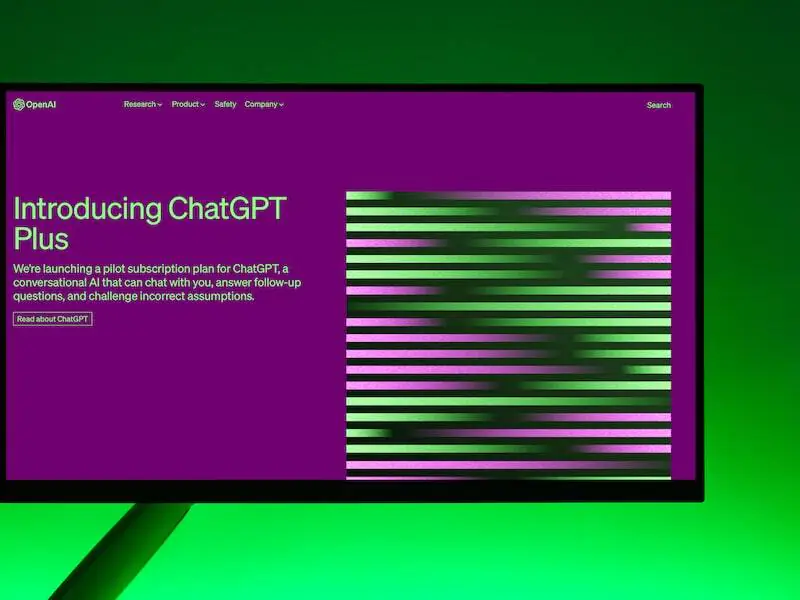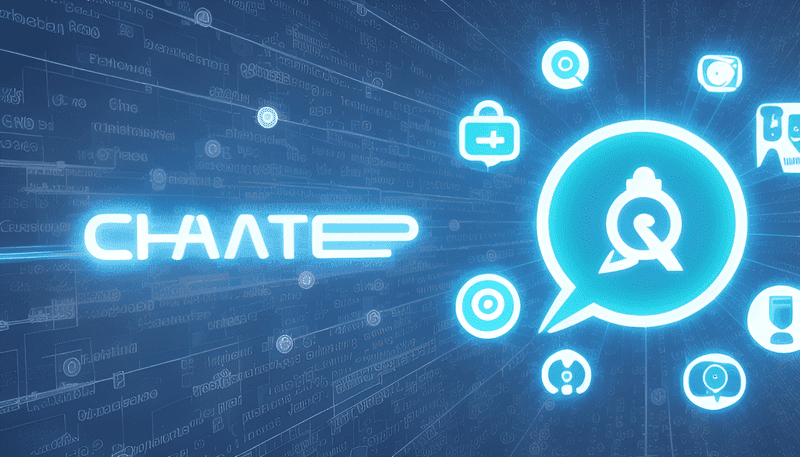“Unleashing the Muse: How ChatGPT is Revolutionizing Scriptwriting
Artikel Terkait Unleashing the Muse: How ChatGPT is Revolutionizing Scriptwriting
- ChatGPT For Consultants: A Strategic Advantage Or Just Another Buzzword?
- Unleash Your Reel Potential: How To Create Engaging Reels Using ChatGPT
- Unleash Your Personal Brand: How ChatGPT Can Be Your Secret Weapon
- Unleash The Power Of AI: Crafting Brand Guidelines With ChatGPT
- Level Up Your Drip Campaigns With The Power Of ChatGPT: A Guide To Personalized Engagement
Table of Content
Video tentang Unleashing the Muse: How ChatGPT is Revolutionizing Scriptwriting
Unleashing the Muse: How ChatGPT is Revolutionizing Scriptwriting

The world of scriptwriting, once the exclusive domain of seasoned professionals hunched over typewriters, is undergoing a seismic shift. Artificial intelligence, particularly large language models like ChatGPT, is emerging as a powerful tool, offering writers new avenues for brainstorming, outlining, dialogue generation, and even overcoming writer’s block. While it’s not poised to replace human creativity entirely, ChatGPT is undeniably transforming the scriptwriting landscape, presenting both exciting opportunities and potential pitfalls.
This article delves into the multifaceted ways ChatGPT is being utilized in scriptwriting, exploring its strengths, limitations, and ethical considerations. We’ll examine practical applications, provide examples, and address common concerns surrounding the integration of AI into this traditionally human-centric art form.
The Dawn of the AI Co-Writer: How ChatGPT Can Assist Scriptwriters
ChatGPT offers a range of functionalities that can significantly aid scriptwriters at various stages of the creative process. Here are some key areas where it shines:
-
Brainstorming and Idea Generation: Staring at a blank page is a common writer’s nightmare. ChatGPT can act as a digital brainstorming partner, offering a torrent of ideas based on prompts. Need inspiration for a sci-fi thriller set on Mars? Simply input the premise, and ChatGPT can generate potential plot points, character archetypes, and even thematic elements. This allows writers to quickly explore different avenues and overcome initial creative hurdles.
- Example: A writer struggling to develop a compelling antagonist for a romantic comedy could ask ChatGPT: "Generate 5 different antagonist archetypes for a romantic comedy, each with a unique motivation and flaw."

-
Outlining and Structure: A well-structured script is crucial for captivating an audience. ChatGPT can assist in creating detailed outlines, breaking down scenes, and ensuring a logical flow of events. By inputting the overall story arc and desired outcome, writers can leverage ChatGPT to generate scene-by-scene breakdowns, complete with potential conflicts, resolutions, and character arcs.
- Example: A writer working on a historical drama could input: "Create a 3-act outline for a historical drama about Marie Curie, focusing on her scientific breakthroughs and the challenges she faced as a woman in science."

-
Dialogue Generation: Crafting realistic and engaging dialogue is a critical skill for any scriptwriter. ChatGPT can generate dialogue based on character profiles, scene context, and desired tone. While it may not always produce perfect results, it can provide a solid starting point, allowing writers to refine and polish the lines to fit their vision.
- Example: A writer needing dialogue for a tense confrontation between two detectives could input: "Generate dialogue for a scene where two detectives are arguing about the best way to approach a suspect in a murder case. One detective is experienced and by-the-book, while the other is young and eager to take risks."

-
Character Development: Compelling characters are the heart of any good story. ChatGPT can assist in developing detailed character profiles, including backstories, motivations, flaws, and relationships with other characters. This can help writers create more nuanced and believable characters that resonate with the audience.
- Example: A writer developing a complex protagonist could ask ChatGPT: "Create a character profile for a cynical but secretly compassionate doctor working in a war zone. Include their backstory, motivations, strengths, and weaknesses."
-
World-Building: For genres like science fiction and fantasy, world-building is paramount. ChatGPT can generate detailed descriptions of fictional worlds, including their history, geography, culture, and social structures. This can help writers create immersive and believable settings for their stories.
- Example: A writer creating a fantasy world could input: "Generate a description of a floating city powered by crystals, including its history, social structure, and key landmarks."
-
Overcoming Writer’s Block: When faced with a creative impasse, ChatGPT can provide a much-needed spark. By generating alternative scenarios, suggesting new perspectives, or simply offering a fresh set of ideas, it can help writers break through mental barriers and regain their creative momentum.
- Example: A writer stuck on a particular scene could ask ChatGPT: "Suggest three different ways the current scene could end, each leading to a different potential outcome for the story."
Navigating the Limitations: Where ChatGPT Falls Short
While ChatGPT offers numerous benefits, it’s crucial to acknowledge its limitations. It’s not a magic bullet that can automatically produce a perfect script.
- Lack of Originality and Creativity: ChatGPT is trained on existing data, meaning its output is often derivative of what it has learned. It can generate ideas and text, but it lacks the true originality and creative spark that comes from human experience and imagination.
- Inability to Understand Nuance and Subtlety: Scriptwriting often relies on subtle cues, unspoken emotions, and complex relationships. ChatGPT can struggle to grasp these nuances, resulting in dialogue and scenarios that feel artificial or forced.
- Potential for Plagiarism: Because ChatGPT generates text based on existing data, there is a risk of unintentionally plagiarizing content. Writers must carefully review and edit ChatGPT’s output to ensure originality and avoid copyright infringement.
- Bias and Stereotyping: ChatGPT is trained on data that may contain biases and stereotypes. This can result in the generation of content that perpetuates harmful stereotypes or reinforces existing inequalities. Writers must be vigilant in identifying and mitigating these biases.
- Inability to Understand Audience Response: A crucial aspect of scriptwriting is understanding how an audience will react to a particular scene or character. ChatGPT cannot predict audience response with accuracy, as it lacks the emotional intelligence and social awareness necessary to gauge human reactions.
- Ethical Concerns Regarding Authorship and Compensation: As AI becomes more prevalent in scriptwriting, questions arise about authorship and compensation. Who owns the copyright to a script co-written with AI? How should writers be compensated for their work when AI plays a significant role in the creative process? These are complex questions that require careful consideration and industry-wide discussion.
Ethical Considerations and Best Practices
Integrating ChatGPT into the scriptwriting process requires careful consideration of ethical implications. Here are some best practices to ensure responsible and ethical use:
- Transparency and Disclosure: Be transparent about the use of AI in your scriptwriting process. Disclose its role to collaborators, producers, and audiences.
- Originality and Verification: Always review and edit ChatGPT’s output to ensure originality and avoid plagiarism. Verify facts and information to ensure accuracy.
- Bias Mitigation: Be vigilant in identifying and mitigating biases in ChatGPT’s output. Strive to create inclusive and representative characters and stories.
- Human Oversight: ChatGPT should be used as a tool to assist human writers, not to replace them. Human oversight and creative input are essential to ensure quality and originality.
- Protecting Intellectual Property: Understand the copyright implications of using AI-generated content. Ensure that you have the necessary rights to use and distribute the material.
- Contributing to the Ethical Discussion: Participate in industry discussions about the ethical implications of AI in scriptwriting. Help shape the future of AI in a responsible and ethical manner.
The Future of Scriptwriting: A Collaborative Partnership
The future of scriptwriting likely lies in a collaborative partnership between human writers and AI tools like ChatGPT. AI can handle tasks like brainstorming, outlining, and generating dialogue, freeing up writers to focus on the more creative aspects of the process, such as character development, thematic exploration, and emotional resonance.
By embracing AI as a tool and understanding its limitations, scriptwriters can unlock new levels of creativity and efficiency. The key is to use AI responsibly, ethically, and in a way that enhances, rather than replaces, the human element of storytelling.
FAQ
- Will ChatGPT replace scriptwriters? No, ChatGPT is a tool to assist scriptwriters, not replace them. It lacks the originality, creativity, and emotional intelligence of human writers.
- Is it ethical to use ChatGPT in scriptwriting? Yes, as long as it’s used responsibly, ethically, and with transparency. Disclose its use, verify originality, and mitigate biases.
- How can I avoid plagiarism when using ChatGPT? Carefully review and edit ChatGPT’s output, verifying facts and ensuring originality. Use plagiarism detection tools to identify potential issues.
- What are the best prompts to use with ChatGPT for scriptwriting? Be specific and detailed in your prompts. Provide context, character information, and desired outcomes.
- Can ChatGPT write a complete script on its own? While it can generate a basic script, it will likely lack depth, originality, and emotional resonance. Human input and refinement are essential.
Conclusion
ChatGPT is undeniably a powerful tool that is transforming the scriptwriting landscape. It offers writers new avenues for brainstorming, outlining, dialogue generation, and overcoming writer’s block. However, it’s crucial to acknowledge its limitations and use it responsibly and ethically. By embracing AI as a collaborative partner and understanding its strengths and weaknesses, scriptwriters can unlock new levels of creativity and efficiency, ultimately crafting more compelling and impactful stories for audiences around the world. The future of scriptwriting is not about replacing human creativity with AI, but about augmenting it, creating a synergistic relationship that leads to a golden age of storytelling.
